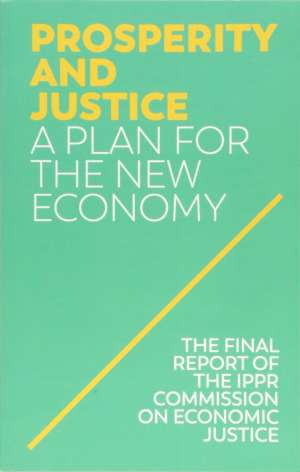25 March 2019
Prosperity and Justice
A plan for the new economy - The Final Report of the IPPR Commission on Economic Justice
IPPR
2018, IPPR, 220 pages,
ISBN 9781509534999
Reviewer: Dame Kate Barker, Chairman of Trustees, British Coal Staff Superannuation Scheme

The focus on ‘justice’ is the title is important. Justice calls to mind a set of rules – and the overarching question in this report is how to change the economic rules in order to achieve outcomes which we would see as ‘just’. It sets out the conclusions of a Commission set up in the wake of the Brexit vote, responding to the perception of public demand for such a change. Members of the Commission included the Archbishop of Canterbury as well as individuals drawn from the business community, trade unions and NGOs. Behind the final report sit an impressive number of background papers.
This was certainly not a trivial exercise, and it tackles the sense of injustice which has echoed powerfully through the Brexit debate. Other groups have commented on some of the issues raised here – indeed I was a member of the Resolution Foundation’s Intergenerational Commission – and some of the analysis and ideas from that Commission are picked up.
In reading this report it was of interest to consider if it uncovered surprising data, if the recommendations add up to a coherent and implementable package, and what policy suggestions in it are novel. It is a rich document, encapsulated inadequately in this review.
Much of the account of the various aspects of injustice seemed familiar. However, new to me at least were some comments about increasing mark-ups across advanced economies and the belief that this suggested declining competitive pressure. It was also interesting to find the comment that in the UK the cost of financial intermediation had remained constant over a period during which it has fallen in other OECD countries.
Similarly, the solutions put forward, while wide-ranging, are in most cases ones that have been suggested by other reports. However, that does not mean the exercise is not worthwhile because it is a well-judged attempt to create a shift in economic power and tackle the concentration of wealth and of economic influence. In particular, some of the recommendations are directed at improving the rights of employees and stress the need for ‘good jobs’ (although I am less convinced of the merits or achievability of the proposed redistribution of working hours from men to women).
On the role of government, the theme of a more active government seeking to create markets and support innovation echoes the present direction of travel in the Industrial Strategy. And there is a good suggestion about asking ONS and OBR to reconsider the definition of ‘investment’ in the government’s accounts. The suggestion that the MPC should have unemployment and nominal GDP targets as well as inflation is less well-founded – it is both economically incorrect and does not reflect the manner in which the MPC has in practice used flexible inflation-targeting. Additionally, although a National Investment Bank is an interesting idea, using it to do counter-cyclical lending seems more problematic - unless there are clear problems with other sources of finance.
The section on wealth echoes the Resolution Foundation in urging an endowment for all young people, and also proposes a Citizens’ Wealth Fund, capitalised by proceeds from wealth taxes among other sources. This leads to the tricky question of tax – where it is proposed among other changes to bring income and gains from investment into tax on the same basis as income from work. Not surprisingly, there is also a proposal aiming to ensure multinationals pay an appropriate amount of tax in the UK.
It all adds up to an interesting read – though it would have benefited from a clearer idea of how the different strands of policy might work together. But the real policy challenge isn’t assembling evidence or writing reviews – it’s a major and sustained commitment to lobbying and persuading for the recommendations. I hope the IPPR is engaged in just that.
One observation from the Commission is ‘People and governments commonly overestimate what they can do in two years and underestimate what they can achieve in ten’. Sadly, any optimism about the prospects for a consistent programme of radical change towards justice rings hollow at this time.
